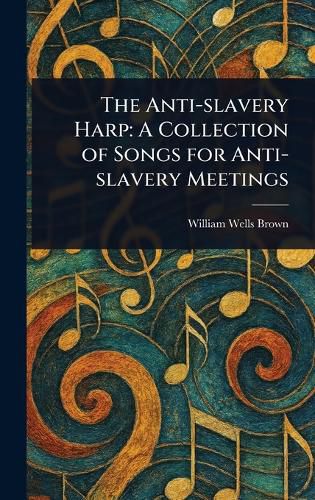Readings Newsletter
Become a Readings Member to make your shopping experience even easier.
Sign in or sign up for free!
You’re not far away from qualifying for FREE standard shipping within Australia
You’ve qualified for FREE standard shipping within Australia
The cart is loading…






This title is printed to order. This book may have been self-published. If so, we cannot guarantee the quality of the content. In the main most books will have gone through the editing process however some may not. We therefore suggest that you be aware of this before ordering this book. If in doubt check either the author or publisher’s details as we are unable to accept any returns unless they are faulty. Please contact us if you have any questions.
"The Anti-slavery Harp: A Collection of Songs for Anti-slavery Meetings" by William W. Brown is a powerful collection of songs born from the heart of the abolitionist movement in the United States. This meticulously prepared edition preserves the potent lyrics and enduring spirit of anti-slavery hymns and spirituals used in meetings and gatherings dedicated to ending slavery.
A vital historical document reflecting the era, this collection offers a unique perspective on the struggle for abolition through the voices of those who fought for freedom and equality. Explore the emotional depth and historical significance of these songs, capturing the fervent beliefs and unwavering determination of individuals committed to social change. This volume is a testament to the power of music as a tool for resistance and a source of hope in the face of injustice. A key resource for understanding the cultural landscape surrounding slavery and the Civil War period.
This work has been selected by scholars as being culturally important, and is part of the knowledge base of civilization as we know it.
This work is in the public domain in the United States of America, and possibly other nations. Within the United States, you may freely copy and distribute this work, as no entity (individual or corporate) has a copyright on the body of the work.
Scholars believe, and we concur, that this work is important enough to be preserved, reproduced, and made generally available to the public. We appreciate your support of the preservation process, and thank you for being an important part of keeping this knowledge alive and relevant.
$9.00 standard shipping within Australia
FREE standard shipping within Australia for orders over $100.00
Express & International shipping calculated at checkout
This title is printed to order. This book may have been self-published. If so, we cannot guarantee the quality of the content. In the main most books will have gone through the editing process however some may not. We therefore suggest that you be aware of this before ordering this book. If in doubt check either the author or publisher’s details as we are unable to accept any returns unless they are faulty. Please contact us if you have any questions.
"The Anti-slavery Harp: A Collection of Songs for Anti-slavery Meetings" by William W. Brown is a powerful collection of songs born from the heart of the abolitionist movement in the United States. This meticulously prepared edition preserves the potent lyrics and enduring spirit of anti-slavery hymns and spirituals used in meetings and gatherings dedicated to ending slavery.
A vital historical document reflecting the era, this collection offers a unique perspective on the struggle for abolition through the voices of those who fought for freedom and equality. Explore the emotional depth and historical significance of these songs, capturing the fervent beliefs and unwavering determination of individuals committed to social change. This volume is a testament to the power of music as a tool for resistance and a source of hope in the face of injustice. A key resource for understanding the cultural landscape surrounding slavery and the Civil War period.
This work has been selected by scholars as being culturally important, and is part of the knowledge base of civilization as we know it.
This work is in the public domain in the United States of America, and possibly other nations. Within the United States, you may freely copy and distribute this work, as no entity (individual or corporate) has a copyright on the body of the work.
Scholars believe, and we concur, that this work is important enough to be preserved, reproduced, and made generally available to the public. We appreciate your support of the preservation process, and thank you for being an important part of keeping this knowledge alive and relevant.